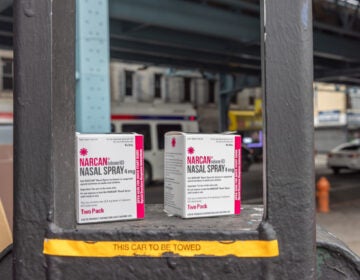Ditch the opioids: New Rutgers study shows over-the-counter pain meds may be more effective for post–wisdom teeth extraction
Researchers compared a combination of ibuprofen and acetaminophen against hydrocodone for treating pain after wisdom tooth surgery.
Listen 1:08
Inside the Nice pharmacy on Allegheny Avenue in Kensington, employees busily fill prescriptions for waiting customers. (Kimberly Paynter/WHYY)
From Philly and the Pa. suburbs to South Jersey and Delaware, what would you like WHYY News to cover? Let us know!
Millions of people every year get one or more wisdom teeth, also called third molars, extracted by a dentist or oral surgeon, and opioids were once considered to be the standard of care to treat pain afterward.
However, advancements in research on analgesics — medications to treat pain — and the ongoing opioid addiction epidemic have underscored efforts to establish new protocols.
Now, findings from a new large-scale study by Rutgers University in New Jersey show that a combination of over-the-counter painkillers commonly found in the average home medicine cabinet is just as effective, if not better, in treating pain after wisdom teeth removal than opioids.
“We’re not saying that there’s never a need for opioids,” Rutgers University School of Dental Medicine Dean Cecile Feldman said. “We’re saying, though, that nonopioids could be used in many situations in place of opioids, and actually, patients will be better for it.”
The study, published online earlier this month in The Journal of the American Dental Association, looked at 1,815 adults who had one or more wisdom teeth removed because they had become impacted and trapped in the lower jawbone.
When a wisdom tooth is surgically removed from this position, it almost always causes a significant amount of pain for several days, Feldman said.
Study participants were either given a combination of ibuprofen and acetaminophen or a combination of acetaminophen and hydrocodone, the most prescribed opioid in dentistry.
Neither the patients nor the researchers knew which medications each person got.
People who received over-the-counter medications reported less pain in the first 48 hours after surgery compared to people who had gotten the opioid, data showed.
“[The nonopioid combination] also resulted in less pain interference, meaning that patients were able to go ahead with their normal daily activities,” Feldman said. “It increased patient overall satisfaction; it decreased side effects that you have with a lot of [opioid] drugs.”
The study builds on previous research showing that over-the-counter meds can be effective in managing pain after extraction surgery, but Feldman said those past studies were small in size and limited in scope.
The newest Rutgers study is the largest of its kind on the topic.
Feldman hopes these results give dental practitioners and patients more confidence in choosing nonopioid medications as a first-line treatment for pain, especially considering the ongoing addiction epidemic.
“Dentists have been responsive to the epidemic and are prescribing a lot less,” she said. “But from my perspective and for those that were involved in the study, we think it could go down even further.”
The next challenge, Feldman said, is educating the public and convincing patients that nonopioid pain management after wisdom tooth removal works.
“There’s still this misconception out there about how opioids are always better,” she said.

Get daily updates from WHYY News!
WHYY is your source for fact-based, in-depth journalism and information. As a nonprofit organization, we rely on financial support from readers like you. Please give today.





